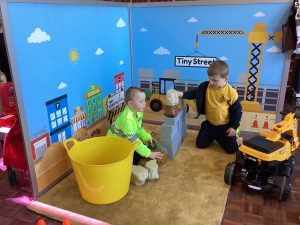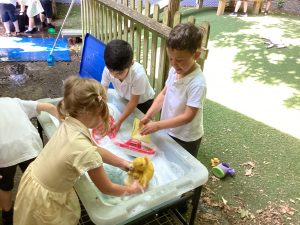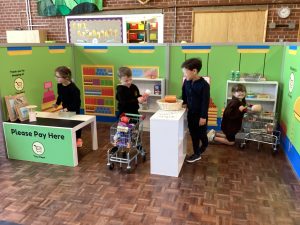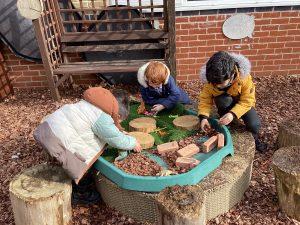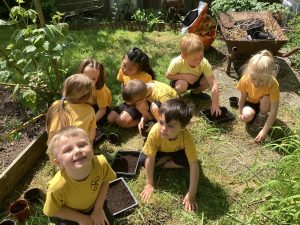
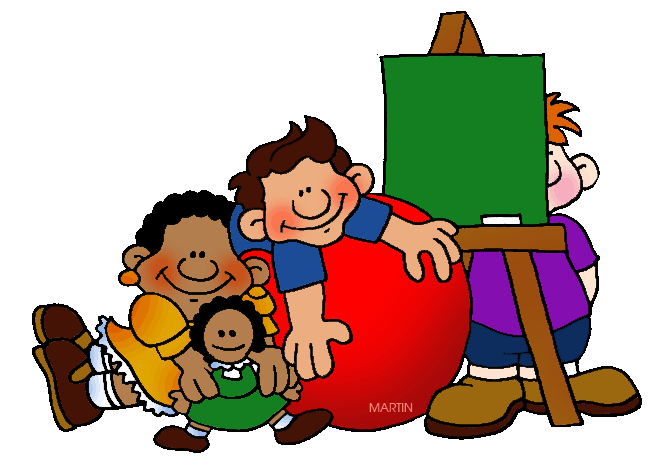 At Sandhurst Primary School, our Early Years Foundation Stage Curriculum is designed to promote and encourage all children to challenge their thinking and find enjoyment in their diverse learning environment. Above all, we want the children to Aim High and Be Happy as they embark on their learning journey at our school. We aim to ensure that we provide all children with the best start to their education that enables them to fulfil their full potential and aim high for future success regardless of their various starting points and backgrounds by creating a holistic and inclusive curriculum. We ensure that all children’s individual needs are met through careful planning and assessment, identifying and addressing any issues and implementing early intervention or additional support if required.At Sandhurst, we recognise every child as a unique individual, and we acknowledge and promote children’s interests to provide them with the opportunities to follow their imagination and creativity. We celebrate the differences in our school community, and always strive to promote and instil a love for learning, a kindness for others and a curriculum that challenges every learning style.
At Sandhurst Primary School, our Early Years Foundation Stage Curriculum is designed to promote and encourage all children to challenge their thinking and find enjoyment in their diverse learning environment. Above all, we want the children to Aim High and Be Happy as they embark on their learning journey at our school. We aim to ensure that we provide all children with the best start to their education that enables them to fulfil their full potential and aim high for future success regardless of their various starting points and backgrounds by creating a holistic and inclusive curriculum. We ensure that all children’s individual needs are met through careful planning and assessment, identifying and addressing any issues and implementing early intervention or additional support if required.At Sandhurst, we recognise every child as a unique individual, and we acknowledge and promote children’s interests to provide them with the opportunities to follow their imagination and creativity. We celebrate the differences in our school community, and always strive to promote and instil a love for learning, a kindness for others and a curriculum that challenges every learning style.
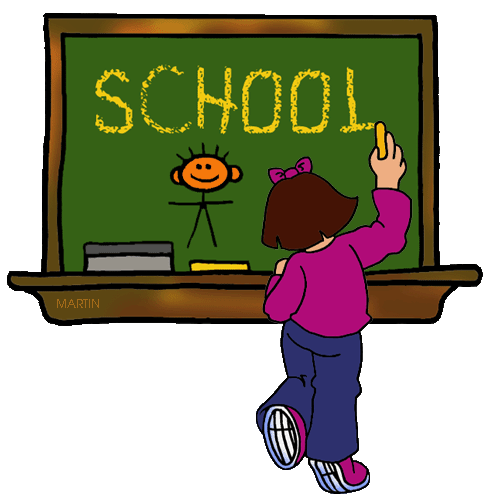 In EYFS, children experience the 17 areas of learning through a balance of whole class/group teaching and play based learning. This is through the children’s interests, themes, continuous provision activities and phonics. Learning is carefully planned by the staff to support early reading, writing, mathematics and language development as well as social skills.At Sandhurst Primary School we encourage children to demonstrate their attitudes and behaviours to learning through the Characteristics of Effective Learning. Our curriculum is designed to recognise their prior learning by providing first hand learning experiences and allowing the children to develop interpersonal skills, build resilience and become creative, critical thinkers to enable them to challenge themselves. We ensure the content of the curriculum is taught in a logical progression so that children build on prior learning.
In EYFS, children experience the 17 areas of learning through a balance of whole class/group teaching and play based learning. This is through the children’s interests, themes, continuous provision activities and phonics. Learning is carefully planned by the staff to support early reading, writing, mathematics and language development as well as social skills.At Sandhurst Primary School we encourage children to demonstrate their attitudes and behaviours to learning through the Characteristics of Effective Learning. Our curriculum is designed to recognise their prior learning by providing first hand learning experiences and allowing the children to develop interpersonal skills, build resilience and become creative, critical thinkers to enable them to challenge themselves. We ensure the content of the curriculum is taught in a logical progression so that children build on prior learning.
Teachers in EYFS create an environment to match the needs and skill levels of our children and use their own teacher assessments and gap analysis to inform their planning and the quality provision. We recognise that reading is a key to all other learning and ensure quality phonic sessions are being taught daily using the whole school approach of Read Write Inc Phonics with children’s reading books matching their phonic ability as well as reading aloud to the children, telling stories and rhymes. We encourage parents to read with their child and to recognise the importance of reading to their child on a daily basis to promote an enjoyment and love of reading. We also recognise that children need a vast range of vocabulary in order to succeed in life.
At this stage in a child’s life learning through play is vital, we use the environment to ensure their needs are met through continuous provision, enhanced provision and following their interests. Formative assessment takes place within every session and helps teachers to identify any children that need more support to achieve the objective and those that need challenging. This may be instantaneous if appropriate. Although EYFS has a separate curriculum we are keen to make sure our children are prepared for the next chapter in their school life. At the end of their EYFS year, the children are assed against the statutory Early Learning Goals as laid out in statutory framework for the early years foundation stage (EYFS). We also use the non-statutory guidance, Development Matters, to help inform our judgement throughout the year.
These documents can be accessed from the Downloads page.
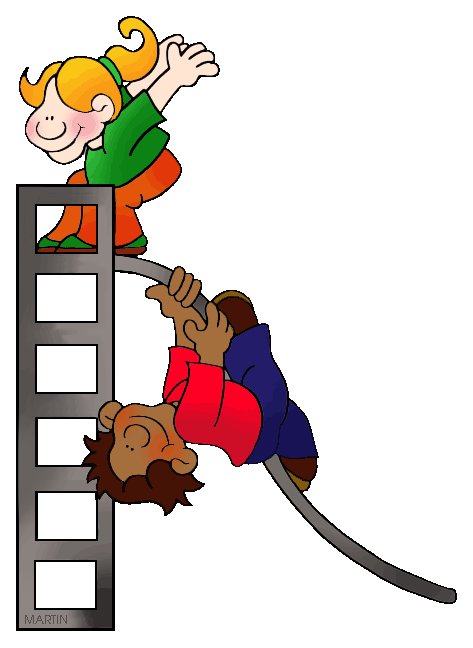 Our EYFS curriculum is Responsive to our children's diverse learning styles. We strive to encourage questioning and reflection, and encompassing multiple layers of learning and experience are an inherent part of developing our children's love for discovery and gives them the best possible to start to their unique learning journey.
Our EYFS curriculum is Responsive to our children's diverse learning styles. We strive to encourage questioning and reflection, and encompassing multiple layers of learning and experience are an inherent part of developing our children's love for discovery and gives them the best possible to start to their unique learning journey.
Children leave EYFS, well rounded, happy and confident children who are well prepared for the transition to Year 1. EYFS staff have a strong understanding of how Early Learning Goal’s link to the National Curriculum, and through our robust planning and delivery across the spectrum of subjects – both core and foundation - children leave the EYFS stage with the skills, knowledge and confidence needed to continue their journey as scientists, historians, artists, geographers, musicians, authors and mathematicians. Children demonstrate high levels of engagement and enjoyment in activities, developing their speaking and listening skills, enabling them to access more areas of learning and communicate to both adults and children. Children develop skills across all areas of the curriculum including Literacy, Mathematics and Physical Development using these in different ways. Children will have developed a wider sense of the world around them and can draw on these experiences during interactions with others and link this to new learning. We aim high to ensure children make at least expected steps of progress from their starting points and for many children, they make rapid progress.
